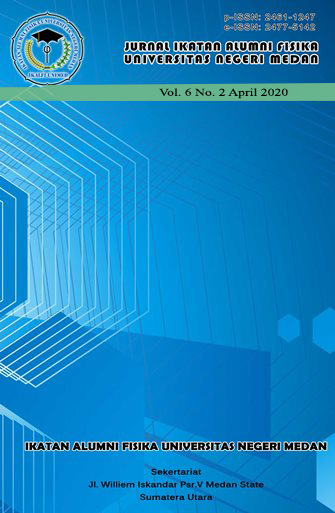EFFECT OF SCIENTIFIC INQUIRY LEARNING MODEL TOWARDS STUDENT LEARNING RESULTS IN SMAN UNGGULAN SUKMA NIAS
DOI:
https://doi.org/10.24114/jiaf.v6i2.17031Keywords:
, Scientific Inquiry, Conventional, Learning Outcomes.Abstract
This study aims to analyze the learning outcomes of students taught with the Scientific Inquiry learning better than students who are taught with conventional learning. This research is a quasi-experimental study. The sample selection is done by cluster random sampling technique in two classes, where the first class is taught with the Scientific Inquiry learning and the second class with conventional learning. The instrument used consisted of learning achievement tests. The results showed that the learning outcomes of students who were taught with the Scientific Inquiry learning were better than students who were taught with conventional learning, this was evidenced by the results of the grades of students who were taught with the Scientific Inquiry learning obtained an average score of Learning Outcomes 70.07 and students who are taught with conventional learning get an average score of 64,13 Learning OutcomeReferences
Arends, R.I. 2012. Learning To Teach Ninth Edition. New York: The McGraw Hill Companies.
Arikunto, S. 2013. Prosedur Penelitian Suatu Pendekatan Praktik. Jakarta: Rineka Cipta.
Arikunto, Suharsimi, 2009, Dasar-Dasar Evaluasi Pendidikan, bumi aksara, Jakarta.
Costa, A.L. 1985. Developing Minds A Resource Book For Teaching Thinking. Alexandria: ASCD.
Demirbag & Gunel. 2014. Integrating Argument-Based Science Inquiry with Modal Representations: Impact On Science Achievement, Argumentation and Writing Skills. Educational Sciences: Theory & Practice-14(1).
Deta, U.A. 2013. Pengaruh Metode Inkuiri Terbimbing Dan Proyek, Kreativitas, Serta Keterampilan Proses Sains Terhadap Prestasi Belajar Siswa. Jurnal Pendidikan Indonesia 9 (2011): 28-34.
Dhakaa, A. 2012. Biologycal Science Inquiry Model And Biology Teaching. Bookman International Journal Of Accounts, Economics & Business Management, Vol 1 No 2.
Dimyati & Mudjiono. 2009. Belajar dan Pembelajaran. Jakarta: Rineka Cipta.
Djamarah & Syaiful B. 2000. Guru dan Anak Didik Dalam Interaksi Edukatif. Jakarta: Rineka Cipta.
Djamarah, Syaiful B., Zain, A. 2010. Strategi Belajar Mengajar. Jakarta: Rineka Cita.
Hamalik, O. 2003. Kurikulum Dan Pembelajaran. Jakarta: Bumi Aksara.
Indrajit, D. 2009. Mudah dan Aktif Belajar Fisika Untuk Kelas X SMA/MA. Jakarta: Pusat Perbukuan Departemen Pendidikan Nasional.
Joyce, B. & Weil, M. 2003. Models Of Teaching (5th Ed). New Delhi: Privite Limited.
Joyce, B., Weil, M., Calhoun, E. 2009. Models Of Teaching (Model-Model Pengajaran Edisi Kedelapan). Terjemahan oleh Achmad Fawaid dan Ateilla Mirza. 2009. Yogyakarta: Pustaka Pelajar.
Sagala, S. 2009. Konsep dan Makna Pembelajaran. Bandung: Alfabeta.
Sani, R.A. 2012. Pengembangan
Laboratorium Fisika. Medan:
UNIMED PRESS.
Sanjaya, W. 2009. Strategi Pembelajaran Berorientasi Standar Proses Pendidikan. Jakarta: Kencana Prenada Media Group.
Sanjaya, Wina, 2008, Strategi Pembelajaran Berorientasi Standar Proses Pendidikan, Kencana, Jakarta.
Slameto, 2003, Belajar dan Faktor-Faktor yang Mempengaruhi, Rineka Cipta, Jakarta.
Sudiarto, 1989, Penilaian Hasil Proses Belajar Mengajar, Remaja Rosdakarya, Bandung.
Sugiyono. 2012. Metode Penelitian
Pendidikan (Pendekatan Kuantitatif, Kualitatif dan R&D). Bandung:AlfaBet
Downloads
Published
Issue
Section
License
Copyright (c) 2020 JURNAL IKATAN ALUMNI FISIKA UNIVERSITAS NEGERI MEDAN

This work is licensed under a Creative Commons Attribution 4.0 International License.
Authors who publish with this journal agree to the following terms:- Authors retain copyright and grant the journal right of first publication with the work simultaneously licensed under a Creative Commons Attribution License that allows others to share the work with an acknowledgement of the work's authorship and initial publication in this journal.
- Authors are able to enter into separate, additional contractual arrangements for the non-exclusive distribution of the journal's published version of the work (e.g., post it to an institutional repository or publish it in a book), with an acknowledgement of its initial publication in this journal.
- Authors are permitted and encouraged to post their work online (e.g., in institutional repositories or on their website) prior to and during the submission process, as it can lead to productive exchanges, as well as earlier and greater citation of published work (See The Effect of Open Access).


 Jl. Williem Iskandar Psr. V, Medan Estate, Kec. Percut Sei Tuan, Kabupaten Deli Serdang, Sumatera Utara 20221
Jl. Williem Iskandar Psr. V, Medan Estate, Kec. Percut Sei Tuan, Kabupaten Deli Serdang, Sumatera Utara 20221